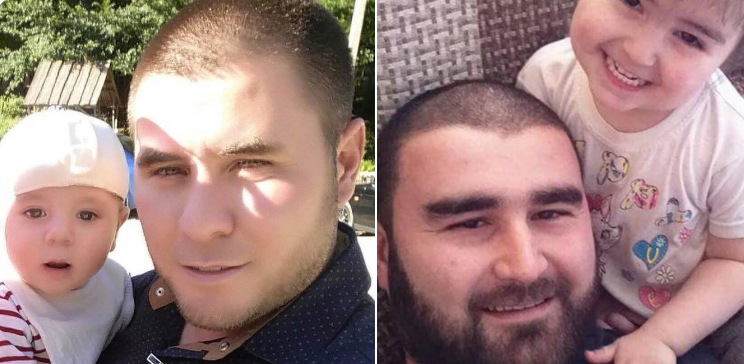• Topics / Human Rights Abuses in Russian-occupied Crimea
Russia breaks all records in Crimea with level of persecution of 8 Crimean Tatars

The FSB ‘investigators’ in Russian-occupied Crimea have suddenly changed the indictment against two political prisoners from Bakhchysarai, arrested for their faith and involvement in the Crimean Solidarity civic initiative in October 2017. The move, which could result in Memet Belyalov and Timur Ibragimov being sentenced to 20 years or even life imprisonment, is not based on any empirical evidence and may simply be because the FSB got their fingers burned over a similarly flawed case and are now ‘playing safe’.
Belyalov’s lawyer Edem Semedlyaev explains that all eight men in this ‘case’ were informed on 5 March that the preliminary investigation had been concluded, with the next stage being to read the file material. His client, however, together with Ibragimov, were handed a decision stating that the charges against them had been changed from ‘involvement in a terrorist group’ to ‘organizing’ such a group.
These apparently alarming charges are nothing of the kind. They are based solely on unproven allegations of involvement in Hizb ut-Tahrir, a peaceful, pan-Islamist party which is legal in Ukraine and which has never committed any act of terrorism anywhere. This is the reason why all those convicted on such charges are recognized as political prisoners by the authoritative Memorial Human Rights Centre. The latter has thus far not even waited until the depressingly predictable ‘convictions’ before declaring Crimean Muslims arrested on such charges political prisoners, as Russia is also violating international law by imposing its legislation on occupied territory, with this especially shocking since Hizb ut-Tahrir is not banned in Ukraine.
The first such prosecutions in occupied Crimea had one person designated as ‘organizer’, under Article 205.5 § 1 of Russia’s criminal code, with three or more others accused of ‘involvement’ (Article 205.5 § 2). The reason for one charge, not the other, were always very arbitrary, but that appeared to be the pattern that the FSB followed.
On August 21, 2018, the previous ‘template’ for these FSB prosecutions in occupied Crimea was suddenly turned on its head when the Russian military court ‘trying’ Crimean Tatar human rights activist Emir-Usein Kuku and five other Ukrainian Muslims suddenly proposed that the prosecutor change the indictment against Envir Bekirov.
The court, under presiding judge Nikolai Vasilchuk, asserted that from one of the illicit recordings used as supposed evidence in this case, it could be concluded that Bekirov had organized a meeting in the school where he worked as a guard. The ‘judges’ saw this as enough to change the charge to ‘organizing a Hizb ut-Tahrir’, with this potentially carrying a life sentence.
There are, in fact, grounds for suspecting that this decision, like all in such cases, did not come from the judges, and that the real reason for sending the case back for changes to the indictment was very different. The identity of one of the ‘secret witnesses’ had been exposed during the hearings, with this giving reason to believe that his ‘cooperation’ with the FSB had been obtained via torture and threats (details here).
There is nothing to indicate why the FSB should have decided to now change the indictment against Belyalov and Ibragimov, but it could be as trivial that they initiated a discussion on religious matters that the FSB’s obliging ‘experts’ have claimed prove involvement in Hizb ut-Tahrir.
Semedlyaev told Krym.Realii that this prosecution of eight Crimean Tatars from Bakhchysarai is a ‘record-breaker’ for Crimea in terms of the severity of the charges, with three people now accused of being ‘organizers’ and facing huge sentences..
It should be noted that it is a record-breaker for another reason as well. Of the eight defendants, a large number, including Ibragimov and the third person accused of ‘organizing’ a Hizb ut-Tahrir group, Suleyman (Marlen) Asanov, were active in Crimean Solidarity. This civic initiative, which helps political prisoners and their families, and also circulates information about repression, has come under heavy attack by the Russian occupation regime. There are very strong grounds for believing that the men now in prison have been targeted as Crimean Solidarity activists.
All eight men were also informed on 23 February 2019 that they are being charged with ‘planning to violently seize power’ (under Article 278). This new charge is not based on any evidence about the men and simply follows from the Supreme Court’s ruling in 2003 that secretly declared Hizb ut-Tahrir a ‘terrorist organization’.
Six of the men were arrested on 11 October 2017 after armed searches that traumatized the men’s children but found nothing but some religious literature. Marlen Asanov was immediately designated ‘organizer’, with Belyalov, Ibragimov, Ernest Ametov; Seiran Saliev and Server Zekeryaev all charged with ‘involvement’ in Hizb ut-Tahrir.
As mentioned, most of them were unquestionably involved in Crimean Solidarity which Russia had begun persecuting. On 21 May, 2018, more armed searches were carried out, with Server Mustafaev, Coordinator of Crimean Solidarity, and Edem Smailov (who had also been involved in Crimean Solidarity activities) arrested and charged with ‘involvement’ in the same ‘case’ as the other six men.
All of the men are married, with children, most very small. None is accused of any crime as understood in a democratic country, yet under Russian occupation, they are facing from 10 years’ imprisonment to life.





